Career
Heavy Mental
How neuroscience gave me a rock band, a documentary, and a play.
Updated September 13, 2023 Reviewed by Tyler Woods
Key points
- I grew up in a small Cajun town in Louisiana with a love of music and very little interest in science.
- Somehow, I became a neuroscientist and put music behind me, but later returned to it.
- In 2006, The Amygdaloids formed. We created the Heavy Mental (mind and brain) genre, and released five albums.
%20003.jpg?itok=Y0kJzsxM)
I do research on the brain mechanisms of mind and behavior. In previous posts, I have explained my research and its implications. The present piece is about how I managed to meld my life-long interest in music with my research, and how this amalgam recently resulted in two unexpected outcomes: a documentary about my life, work, and music, and a musical based on my songs.
Growing Up with Music
I grew up in the part of South Louisiana called Cajun Country. My hometown, Eunice, was an epicenter of Cajun music. But that wasn’t the only kind of music kicking around. There was also a black version known as Zydeco, and a white offshoot known as Swamp Pop. But there was no shortage of other Southern music staples—blues, rhythm and blues, and country. When I think about my early life experiences, I hear music.
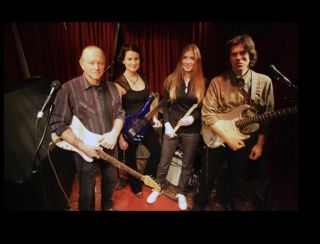
I got my first guitar, a nylon string folk model, in 1963 when I was a freshman in high school. But my folk days were left blowing in the wind as soon as The Beatles invaded in February of 1964. I acquired an electric guitar and an amp as soon as I could convince my parents of the absolute necessity of these purchases. I was in a band (The Dead Beats) and then another band (The Countdowns), and was also a disc jockey on KEUN, the local radio station. But as the years went by, and the pressures of becoming an adult took over, I had less and less time for music.
Life as a Scientific Musician
Fast forward to 2006. I was well-established as a neuroscientist and felt I could make time for music. I started playing regularly with my friend Tyler Volk, a colleague at NYU. Eventually, we formed a band called The Amygdaloids, named after the part of the brain I researched. Daniela Schiller, then a postdoc at NYU, and now a Professor at Mount Sinai in New York, was our drummer. The bass spot frequently turned over—occupants included Nina Curly, Gerald McCallum, Amanda Thorpe, and Colin Dempsey.
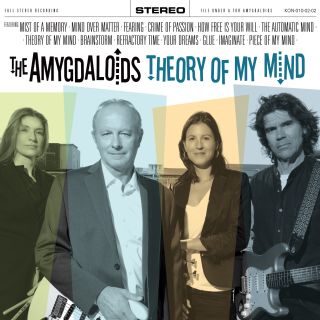
Our first gig was for the Secret Science Club in Brooklyn. We described it as an evening of music about mind and brain and mental disorders. A local newspaper picked up on this, titling their short blurb about the show as “Heavy Mental.” We played some relevant covers (“19th Nervous Breakdown” by the Rolling Stones, “Manic Depression” by Jimi Hendrix, and a couple of originals that I wrote—"All in a Nut” and “Body Problem.” The former was about work on the amygdala (Greek for almond, hence the nut reference), and the latter was about the philosophy of mind, which I had followed since my Ph.D. on consciousness in split-brain patients. We latched onto the “heavy mental” label and used it for the title of our first album.
From that point on, we have claimed “Heavy Mental” as our unique musical genre, as is obvious from the titles of our albums: Theory of My Mind, All in Our Minds, More Songs in Our Minds, and Anxious. Anxious was written to go with my book of the same name. I also wrote music for my last book, The Deep History of Ourselves.
Over the years, as my work and music became more and more intertwined, it became increasingly common to be invited to both give scientific lectures and play my heavy mental songs, either as part of the lecture or at an evening concert in a pub (or both). For these lecture/music events, Colin Dempsey would join. We played in Mexico City; Uppsala, Sweden; Stavanger, Norway; Rome, Turin, Montreal, and other places. Our most recent gig was in Stockholm, where I gave a lecture at the Karolinska Institute about my work, but also one about my personal history with music. Colin and I played a few songs after the lecture, but then also at a club in town.
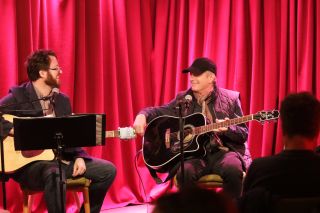
Despite the puns in some of the titles, the tunes are not geeky, science songs. They’re regular pop/rock tunes with lyrical twists. If you heard one on the radio, you wouldn’t think, “Oh, that’s a science band.”
A Documentary Takes Shape
The story of The Amygdaloids is intricately entwined with the story about how a documentary about my life, work, and music came to pass. In 2007, clinical psychologist Jennifer Brout and her colleague Tim Sommer, a musician and writer, were interested in the condition known as misophonia, and the possibility that music could be therapeutically helpful. They came across my research on the amygdala’s processing of sound-related threats and thought it might be relevant. While exploring my work, they also discovered my Heavy Mental music. They were intrigued by idea of a band of scientists writing love songs about deep issues related to mind and brain, and offered to produce the next album. In 2010, Theory of My Mind, which included backing vocals by Rosanne Cash on two songs, was released. Brout and Sommer continued to follow my research and music, and began exploring the possibility of doing a documentary about me. In 2015, they engaged Kurt Feldhun as the director to make Neuroscience & Emotions: The Life, Work & Music of Dr. Joseph LeDoux.
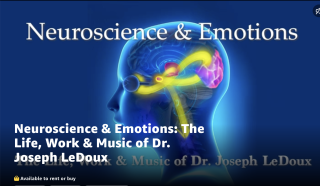
The documentary came out on Amazon this year. Here's a synopsis: "The film tells the story of the son of a Cajun bull riding butcher who emerges from this unlikely background to become one of the worlds' leading neuroscientists. The film begins with his life growing up in Eunice, Louisiana, one of the focal loci of Cajun music. He had little interest in science and earned two degrees in business before discovering brain research and rising to the top through his explorations of emotion. Throughout his life music has been a passion. The story is told through interviews with LeDoux and leading scientific colleagues, such as Nobel Prize winner Eric Kandel, but also musicians LeDoux has interacted with, including Rosanne Cash and Lenny Kaye (Patti Smith Group) among others."
Map of Your Mind
When people familiar with The Amygdaloids’ songs are asked, “Which is your favorite?” the most common response is, “Map of Your Mind.” The song turns the psychological construct of “theory of mind” into a story about how, in romantic relationships, one has to enter the mental space of the other. Here’s quote from the lyrics: “I’ve made a map of your mind / I’ve charted my course / I’m sailing deep inside / I’ve got the winds of force / I’ve got the heat of your heart / to keep me from the cold / I’ve got the currents of wind, to take me to your soul.’
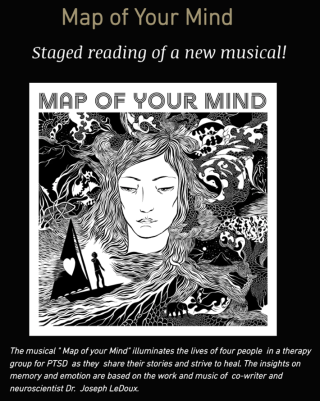
A couple of years ago, Lynne Kaufman, a playwright in San Francisco, was working on a musical about PTSD and came across my research on traumatic memory. My lab had played a key role the discovery of the phenomenon called "memory reconsolidation." This is the idea that each time you retrieve a memory, you have to restore it. Therefore, it might be possible to dampen traumatic memories using pharmaceuticals that disrupt the restorage process. Like Brout, Kaufman incidentally discovered my music through my work.
Thinking that “Map of Your Mind” might be a good fit in her musical about a PTSD group therapy session, she asked if she could use it. I said that she could use as many of my songs as she liked. At that point, she was not familiar with the extent of my catalog of songs and began to explore it. The result was that she used the lyrical content of 15 of them to create the narrative arc of the play. For example, one of the songs was "A Trace"—about memory traces, and another, “Memory Pill,” which was about using reconsolidation blokade to dampen memory traces. When I read the script, I was blown away by the powerful story she constructed about the suffering, healing, and coming together of the of the patients.
In January of this year, we did a staged reading at the Marsh Theatre in San Francisco with professional actors reading their characters’ parts. Colin and I played guitar, and a local drummer kept the beat. The audience—which included scientists, clinicians, and lay people, including PTSD patients, from the Bay area—responded with enthusiasm in a question-and-answer session afterwards. A recording of the staged reading and other information about “Map of Your Mind” is available here. We are currently exploring the possibility an actual production of the musical.
Coda
It was wonderful to be able, via The Amygdaloids, to integrate my life-long love of music with my passion for understanding the brain. But the documentary and the musical have taken things to a new level. I am so grateful to Jennifer Brout, Tim Sommer, Kurt Feldhun, and Lynne Kauffman for making these unlikely events happen.
References
A Band of Scientists Who Really Are a Band (New York Times)
Message in the Music (Forward Magazine)
Joseph LeDoux's heavy mental (Salon online)
The Amygdaloids Mix Neuroscience And Rock 'N' Roll
Beautiful Tunes @ The Beautiful Brain
All in the Mind: Fear, brains and rock'n'roll: meet Joe LeDoux
Music and the Brain, Literally
The Amygdaloids on "Science & U"
Science and the arts: Rock and research
Neurobiologist /musician Joseph LeDoux on anxiety and fear
Music on the Mind: Rocking Out for CNS 2016
Joseph LeDoux talks about Fear, Anxiety and The Amygdaloids on the Anxiety Bites Podcast




